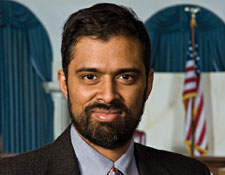Constitutional Law Scholar Joins Faculty
by Rob Seal
 |
Saikrishna Prakash, a prominent constitutional law scholar, joined the Law School faculty this fall as David Lurton Massee, Jr., Professor of Law and Sullivan & Cromwell Professor of Law. Previously, Prakash was Herzog Research Professor of Law at the University of San Diego School of Law. He was a visiting professor at Virginia during the spring 2008 semester.
“Sai Prakash is a scholar of the first rank — rigorous, creative, insightful and prolific,” said Professor Caleb Nelson. “He is also a wonderful person.”
Prakash has written on topics that range from the removal of federal judges to the scope of federal power over Native American tribes, but said his current research interests focus on constitutional law, and specifically on presidential powers. “That includes everything from his control of law execution and removal of executive officers to war powers and military powers,” he said.
Currently Prakash is working on a book that will examine the historical origins and meanings of the president’s constitutional powers.
“It’ll examine what I think the Constitution meant with respect to executive powers in 1789 by looking at the English, colonial, state and national antecedents of the president such as governors and the king,” Prakash said. “It will also shed light on Washington’s understanding of his constitutional powers.”
The original interpretations of presidential powers have changed significantly over the past two centuries, he said. “The president has more military power today than they understood him to have back in 1789, but has less authority over law execution today than he did at the founding, so it’s a mixed bag. People today tend to think that we have an imperial presidency, and that’s true with respect to certain powers. But regarding other powers, the presidency seems somewhat imperiled.”
The past few years have been a ripe time for the study of constitutional law, and though his book will have a primarily historical focus, Prakash said he is hopeful it will have some contemporary resonance. “This has been quite an interesting and exciting time for people in the field,” he said.
Professor Dan Ortiz said Prakash has a talent for tackling contentious and divisive issues. “He wades into very controversial areas and comes out saying something new in a way that doesn’t seem to be politically charged, and which often overturns the conventional understandings of things,” Ortiz said. “The way he says it and the strength of his analysis convinces people.”
Prakash, who relocated to Charlottesville this summer with his wife and daughters, said he is happy to return to the community and the Law School. “I thought the faculty and the students were amazing when I visited, and I really enjoyed their company both in the classroom and outside,” he said. “We’ve found Charlottesville to be a very pretty place, especially in the spring time.”
After graduating from Yale Law School in 1993, Prakash clerked for Judge Laurence H. Silberman of the U.S. Court of Appeals in Washington, D.C., from 1993 to 1994, and for U.S. Supreme Court Justice Clarence Thomas from 1994 to 1995. He practiced in New York for two years, and has also taught at the law schools of the University of Illinois and Boston University.



